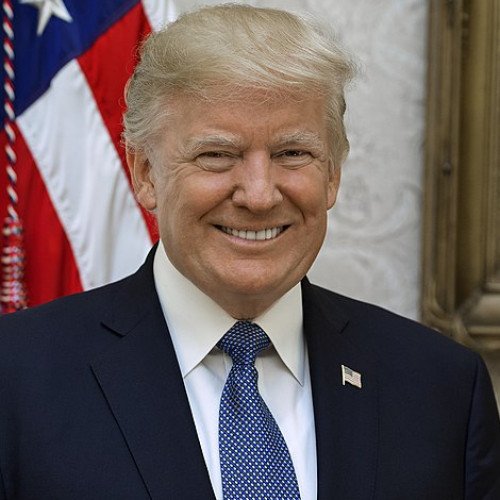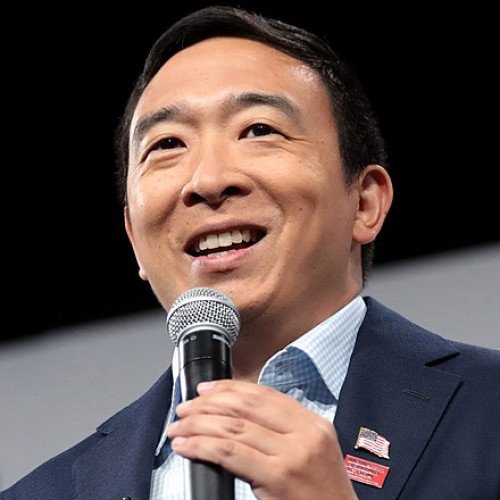Donald Trump VS Andrew Yang

Donald Trump
Donald John Trump (born June 14, 1946) is an American politician who was the 45th president of the United States from 2017 to 2021. Before entering politics, he was a businessman and television personality. Born and raised in Queens, New York City, Trump attended Fordham University for two years and received a bachelor's degree in economics from the Wharton School of the University of Pennsylvania. He became the president of his father Fred Trump's real estate business in 1971, which he renamed The Trump Organization; he expanded the company's operations to building and renovating skyscrapers, hotels, casinos, and golf courses. Trump later started various side ventures, mostly by licensing his name. Trump and his businesses have been involved in more than 4,000 state and federal legal actions, including six bankruptcies. He owned the Miss Universe brand of beauty pageants from 1996 to 2015, and produced and hosted the reality television series The Apprentice from 2004 to 2015. Trump's political positions have been described as populist, protectionist, isolationist and nationalist. He entered the 2016 presidential race as a Republican and was elected in an upset victory over Democratic nominee Hillary Clinton while losing the popular vote. He became the first U.S. president without prior military or government service. His election and policies have sparked numerous protests. Trump made many false and misleading statements during his campaigns and presidency, to a degree unprecedented in American politics. Many of his comments and actions have been characterized as racially charged or racist. During his presidency, Trump ordered a travel ban on citizens from several Muslim-majority countries, citing security concerns; after legal challenges, the Supreme Court upheld the policy's third revision. He enacted a tax-cut package for individuals and businesses, rescinding the individual health insurance mandate penalty of the Affordable Care Act (ACA). He appointed Neil Gorsuch, Brett Kavanaugh and Amy Coney Barrett to the Supreme Court. He reacted slowly to the COVID-19 pandemic, downplayed the threat, ignored or contradicted many recommendations from health officials, and promoted false information about unproven treatments and the availability of testing. In foreign policy, Trump pursued an America First agenda: he renegotiated the North American Free Trade Agreement (NAFTA) as the United States–Mexico–Canada Agreement (USMCA) and withdrew the U.S. from the Trans-Pacific Partnership trade negotiations, the Paris Agreement on climate change and the Iran nuclear deal. He imposed import tariffs which triggered a trade war with China, moved the U.S. embassy in Israel to Jerusalem and withdrew U.S. troops from northern Syria. He met three times with North Korean leader Kim Jong-un, but negotiations on denuclearization eventually broke down. A special counsel investigation led by Robert Mueller found that Trump and his campaign benefited from Russian interference in the 2016 presidential election, but did not find sufficient evidence to press charges of criminal conspiracy or coordination with Russia. Mueller also investigated Trump for obstruction of justice and his report neither indicted nor exonerated Trump on that offense. Trump later pardoned five people who were convicted as a result of the Russia investigation. After Trump solicited Ukraine to investigate his political rival Joe Biden, the House of Representatives impeached him in December 2019 for abuse of power and obstruction of Congress. The Senate, after refusing to hear witness testimony, acquitted him of both charges in February 2020. Trump lost the 2020 presidential election to Biden but refused to concede defeat. He attempted to overturn the results by making false claims of electoral fraud, pressuring government officials, mounting dozens of unsuccessful legal challenges and obstructing the presidential transition. Hours before the ceremonial counting of the electoral votes on January 6, 2021, Trump rallied his supporters and exhorted them to march to the Capitol, which they then stormed. Five deaths resulted, and Congress was evacuated. Seven days later, the House of Representatives impeached him again, for "incitement of insurrection", making him the only American federal officeholder to be impeached twice.
Statistics for this Xoptio

Andrew Yang
Andrew M. Yang (born January 13, 1975) is an American entrepreneur, politician, philanthropist and Democratic candidate for New York City mayor. Originally a lawyer, Yang began working in startups and early stage growth companies as a founder or executive from 2000 to 2009. In 2011, he founded Venture for America (VFA), a nonprofit organization focused on creating jobs in cities struggling to recover from the Great Recession. He ran in the 2020 Democratic presidential primaries, and is running in the 2021 New York City mayoral election. The son of immigrants from Taiwan, Yang was born and raised in New York. He attended Brown University and then Columbia Law School. Dissatisfied with his work as an attorney, Yang began working for startups during the dot-com bubble before spending a decade as an executive at test preparation company Manhattan Prep. In 2011, Yang founded VFA, which recruits top college graduates into a two-year fellowship program at startups in developing cities across the United States. The Obama administration selected him in 2011 as a "Champion of Change" and in 2015 as a "Presidential Ambassador for Global Entrepreneurship." Yang left VFA in 2017 to focus on his presidential campaign. In 2018, he authored The War on Normal People, which outlines several of his campaign's central ideas. On November 6, 2017, Yang filed with the Federal Election Commission (FEC) to run for President of the United States in the 2020 election. Yang's campaign largely focused on responding to the rapid development of automation, which is increasingly leading to workforce challenges and economic instability in the United States. His signature policy was the "Freedom Dividend," a universal basic income (UBI) of $1,000 a month to every American adult as a response to job displacement by automation, one of the primary factors that he claims led to Donald Trump's election in 2016. Considered a dark horse candidate throughout much of the primary, Yang received significant popularity online, with The New York Times calling him "The Internet's Favorite Candidate". News outlets described Yang as the most surprising candidate of the 2020 election cycle, going from a relative unknown to a major competitor in the race. Yang qualified for and participated in seven of the first eight Democratic debates, and has been credited with elevating discussions on UBI, automation, and autism to the national level, as well as for engaging Asian Americans in presidential politics.Yang's campaign was noted for its happy-go-lucky and "tech-friendly" nature. His supporters, informally known as the "Yang Gang", included several high-profile celebrity endorsements and were noted for their ideological and political diversity. Yang suspended his campaign on February 11, 2020, shortly after the New Hampshire primary, pledging that he and his movement are "just getting started." Following his campaign's end, Yang joined CNN as a political commentator, announced the creation of the political nonprofit organization Humanity Forward, and is running for the Democratic nomination in the 2021 New York City mayoral election.